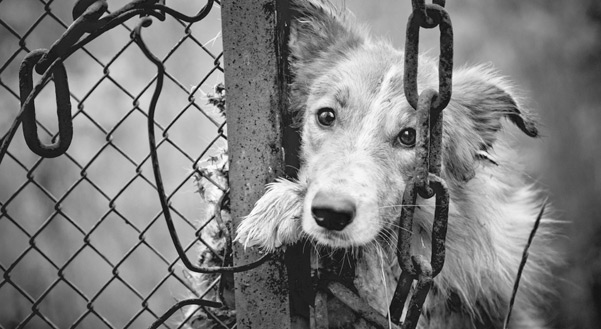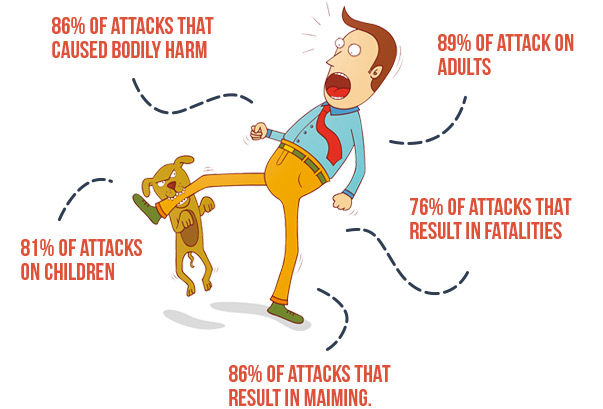
Dogs are the first animal ancient man domesticated, and they remain man’s best friend. But dogs are animals, and even a family pet dog can act aggressively in certain situations and attack. Being bitten by a dog may result in a serious injury, including physical and psychological trauma.
The American Veterinary Association estimates that 4.5 million people in the U.S. are bitten by dogs every year. About 20 percent of dog bite victims (900,000 a year) require medical attention, including 27,000 who require reconstructive surgery from dog bite injuries. About 30 people die each year because of a vicious dog bite injury.
Children comprise about half of the victims of dog attacks. Young children may not recognize a dog’s signs of fear or distress and try to play with a dog. Elderly people also are more vulnerable than other adults to dog attacks. Letter carriers for the U.S. Postal Service are the third most likely individuals to be bitten by a dog, the National Safety Council says, though any outdoor worker – including delivery drivers, utility workers, police officers, and landscapers – risk encountering an aggressive dog.
Dogs act on instinct and training. In Kentucky, the law provides that dog owners can be held fully responsible for the harm their animals cause if the dog attacks. If you or a loved one of yours has been seriously injured in an attack by a dog, a dog bite attorney at Frank Jenkins Law Office can help you. You may be eligible to obtain compensation for your medical expenses, property damage, lost wages, pain, suffering, and more.
Responsibility for Dog Bite Injuries in Kentucky
Some states impose a “one bite rule” that excuses dog owners from responsibility for a first-time attack by an animal, but Kentucky holds dog owners liable for an attack. This means that if you were bitten by another person’s dog in KY, then you likely have a dog bite injury claim.
Kentucky law [KRS 258.990(2)] states: “The owner of any dog, cat or ferret which bites a human being shall be liable to pay all damages for personal injuries resulting from the bite of the dog, cat or ferret.” However you still need an experienced dog bite lawyer to help prove your claim and get compensation for your dog bite injury.
You may wonder how realistic is it that you can hold a dog owner responsible for the injury suffered because their dog attacked you. The answer is that, with the proper legal help, it is quite reasonable to expect compensation for your dog bite injuries. A dog bite injury claim can help you pay for medical costs, loss of work, and possible pain and suffering.
Do I Have a Dog Bite Injury Claim?
The Insurance Information Institute (I.I.I.) says dog bites accounted for more than one-third of all homeowners’ insurance liability claim dollars paid out in 2013. Dog bite injuries are incredibly common. A dog bite attorney can help determine if you have an injury that could lead to a lawsuit.
In 2013, insurance companies, which pay for most personal injury claims, paid out $483.7 million for 17,359 dog bite injuries. That’s an average of $27,862 per claim.
From 2012 to 2013, the number of dog bite claims in the U.S. rose by 5.5 percent. The average payout per claim increased by more than 45 percent in the last decade. This can be attributed to increased medical costs as well as the amount paid in settlements, judgments, and jury awards, which are still on the upswing, according to the Insurance Information Institute.
Not All Dogs Bite, Some Breeds More Likely to Cause Dog Bite Injury
Any dog can bite someone, but some dogs have a reputation for being more aggressive than others. The III says some companies require dog owners to sign liability waivers for dog bites, and some charge more for owners of breeds such as pit bulls and rottweilers. Owners of these breeds may argue that they are unfairly maligned, but the numbers show otherwise.
An analysis of dog attack deaths and maimings in the U.S. and Canada from September 1982 to December 31, 2014 found that certain breeds, including pit bulls, rottweilers, “mollosser breeds” (mastiffs, cane corsos, and other mastiff-like breeds), dogo Argentinos, shar peis, boxers, and their mixes were responsible for:

Breeds Most Likely to Cause Dog Bite Injuries
In 2000, a Centers for Disease Control and Prevention study of dogs involved in fatal human attacks over a 20-year period said 30 breeds of dogs were involved in at least one fatality over two decades. They were:
- Pit bull-type
- Rottweiler
- German Shepherd
- Husky-type (including Siberian)
- Malamute
- Wolf-dog hybrid
- Mixed-breed
- Doberman Pinscher
- Chow Chow
- Great Dane
- Saint Bernard
- Labrador Retriever
- Akita
- Sled-type
- Bulldog
- Mastiff
- Boxer
- Collie
- Bullmastiff
- Hound-type
- Retriever-type
- Chesapeake Bay Retriever
- West Highland Terrier
- Terrier-type
- Japanese Hunting Dog
- Newfoundland
- Coonhound
- Sheepdog
- Australian Shepherd
- Rhodesian Ridgeback
- Cocker Spaniel.
Dog Bite Injuries
Dog bite injuries may be puncture wounds or lacerations caused by a dog’s teeth tearing into flesh. A muscular dog can crush bones with its jaws, particularly bones of the hand or feet. Typically, an attacking dog bites multiple times. A dog may also claw its victim and/or knock them down in an attack, causing such fall injuries as head and brain injury, fractures, sprained back, or spinal injuries.
Children and the elderly are more vulnerable to dog attacks because they have less ability to fend off or escape an attacking dog. Children are more likely to be curious about a dog and unaware of the potential danger, even if the dog exhibits non-vocal aggressive behavior such as a tense body, raised hair, or intense stare.
A review of dog attack cases in Kentucky by the Office of the Chief Medical Examiner in Louisville found that of 11 deaths, 10 consisted of multiple bite marks and blunt force injuries of the head and neck, trunk, and extremities (arms, legs, hands, and feet). In one case, a victim’s immediate cause of death was a blood-borne infection secondary to a dog bite.
A survey of dog bite injuries in children published by The American Surgeon found that:
- More than 67 percent of injuries were to the head and neck; all patients 5 years of age and younger had head and neck injuries
- 66 percent of patients required surgery
- 41 percent of child dog bite victims suffered injuries to “multiple anatomical areas”
- 46 percent of the attacks involved family pets, and 45 percent were dogs known to the attacked child
- More than half of the attacks were not provoked.
Dog bites can be very scary and painful. But because most of us never suffer a bite from a strange dog, we often don’t know what to do when a bite occurs. Because dog bites can lead to infection, nerve damage, scarring and (in rare cases) disease, it’s important to take action immediately.
The first thing to do when bitten by a dog is to receive medical treatment. If the bite broke the skin or if it causes pain, getting checked out by a Kentucky doctor is always a good idea. Delaying medical attention can complicate matters down the road.
According to MedicineNet:
Medical care should be accessed if the dog bite disrupts the skin causing a puncture, laceration, or tear. As well, if there is pain at or near the injury site, underlying structures may have been damaged and medical care may be needed.
If the skin is not disturbed, or if there is a minimal abrasion present, it may be reasonable to watch for signs of infection (pain, redness, warmth, swelling, and drainage of pus or fluid) before seeking medical care.
Please note: If the victim elects not to seek medical care, the rabies immunization status of the dog needs to be determined immediately. Rabies therapy, if necessary, must begin as soon as possible. As well, the victim’s tetanus status needs to be current.
Infants and children should be evaluated after any dog bite.
Dog Bite Injuries Likely to Cause Infection
The treatment provided by your doctor will depend on the bite. It is easy to look at a dog bite and see that the skin has been damaged, but it is also important to assess the underlying structures that may have also been injured in the attack. The patient often concentrates on the cosmetic appearance of the wound; while that is important, the health care practitioner may be more concerned about the injuries that will impair the body’s function. For example, a laceration to a hand may look bad, but more important than the potential scarring would be a lacerated tendon that would prevent a finger from moving.
The potential for infection is also of great importance. Dog bites inoculate bacteria deep into tissue, and while not as aggressive as cat bites, the majority of dog bites do get infected.
Once the bite has received initial medical attention, you can consider action against the dog owner. You may be entitled to compensation for your injury if you are bitten by a dog.
Contact a Kentucky Dog Bite Lawyer
If you or a loved one has been bitten by a dog and seriously injured in Kentucky, the dog’s owner can be held responsible for your injuries, medical expenses, lost income, and the other costs incurred because of the attack. The Frank Jenkins Law Office can conduct a thorough assessment of your case and review all available options for obtaining compensation you are due.
We can provide an initial consultation about your dog bite case at no charge, and are ready to meet with you in our office, the hospital, or your home, at your convenience. We handle most cases on a contingency basis, which means you pay nothing up front and will only pay a legal fee when we settle or win your case.
Contact the Frank Jenkins Law Office today at 859-389-9344 or contact an attorney online to set up an initial legal consultation today.





